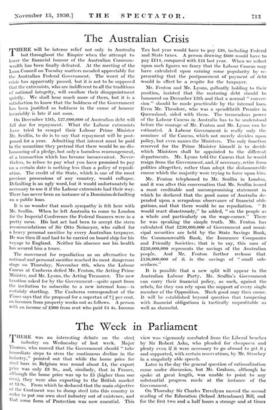The Australian Crisis T HERE will be intense relief not only
in Australia but throughout the Empire when the attempt to lower the financial honour of the Australian Common- wealth has been finally defeated. At the meeting of the Loan Council on Tuesday matters mended appreciably for the Australian Federal Government. The worst of the crisis has apparently passed, but it is not to be supposed that the extremists, who are indifferent to all the traditions of national integrity, will swallow- their disappointment quietly. We shall hear much more of them, but it is a satisfaction to know that the boldness of the Government has been justified as boldness in the cause of honour invariably is late if riot soon.
On December 15th, £27,000,000 of Australian debt will fall due for repayment. What the Labour extremists have tried to compel their Labour- Prime Minister Mr. Scullin, to do is to say that repayment will be post- poned for a year. Admitting that interest must be paid in the meantime they pretend that there would be no dis- honouring of a pledge, but only a harmless rearrangement, of a transaction which has become inconvenient. Never- theless, to refuse to pay what you have promised to pay on a certain date is nothing less than a policy of repudi- ation. The credit of the State, which is one of the most precious possessions of any country, would collapse. Defaulting is an ugly word, but it would unfortunately be necessary to use it if the Labour extremists had their way. There has never been an instance of a Dominion defaulting on a public loan.
It is no wonder that much sympathy is felt here with Mr. Scullin. When he left Australia to come to London for the Imperial Conference the Federal finances were in a pretty mess. His last act had been to accept the stern recommendations of Sir Otto Neimeyer, who called for a heavy personal sacrifice by every Australian taxpayer. He was then ill and had to be carried on board ship for his voyage to England. Neither his absence nor his health has secured him a truce.
The movement for repudiation as an alternative to national and personal sacrifice reached its most dangerous stage on Thursday, November 6th, when the Labour Caucus at Canberra defied Mr. Fenton, the Acting Prime Minister, and Mr. Lyons, the Acting Treasurer. The new taxation asked for by the Government—quite apart from the invitation to subscribe to a new internal loan—is certainly startling. The Canberra correspondent of the Times says that the proposal for a supertax of 71 per cent. on incomes from property works out as follows. A person with an income of £300 from rent who paid £4 4s. Income Tax last year would have to pay £39, including Federal and State taxes. A person drawing £600 would have to pay £114, compared with £41 last year. When we reflect upon such figures we fancy that the Labour Caucus may have calculated upon earning some popularity by re- presenting that the postponement of payment of debt would in effect be a respite for the taxpayer.
Mr. Fenton and Mr. Lyons, gallantly holding to their position, insisted that the maturing debt should be honoured on December 15th and that a normal " conver- sion " should be made practicable by the internal loan. Even Mi. Theodore, who was a spendthrift Premier in Queensland, sided with them. The tremendous power of the Labour Caucus in Australia has to be understood before the courage of Mr. Fenton and Mr. Lyons can be estimated. A Labour Government is really only the nominee of the Caucus, which not merely decides upon policy, but even names the Ministers. The only function reserved for the Prime Minister himself is to decide which Ministers shall be appointed to the different departments. Mr. Lyons told the Caucus that he would resign from the Government, and, if necessary, retire from politics altogether, rather than adopt the dishonourable course which the majority were trying to force upon him.
Mr. Fenton telephoned to Mr. Scullin in London, and it was after this conversation that Mr. Scullin issued a most creditable and uncompromising statement in which he declared that the good name of Australia de- pended upon a scrupulous observance of financial obli- gations, and that there would be no repudiation. " It would react disastrously," he added, " on the people as a whole and particularly on the wage-earner." There he was speaking the simple truth. Mr. Fenton has calculated that £250,000,000 of Government and muni- cipal securities are held by the State . Savings Bank, the Commonwealth Bank, the Insurance Companies and Friendly Societies ; that is to say, this sum of £250,000,000 represents the savings of the Australian people. And Mr. Fenton further reckons that £150,000,000 of it is the savings of " small sub- scribers."
It is possible that a new split will appear in the Australian Labour Party. Mr. Scullin's Government can carry their financial policy, as such, against the rebels, for they can rely upon the support of every single member of the Opposition. Much good may then ensue. It will be established beyond question that tampering with financial obligations is tactically unprofitable as well as shameful.








































 Previous page
Previous page